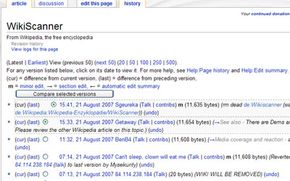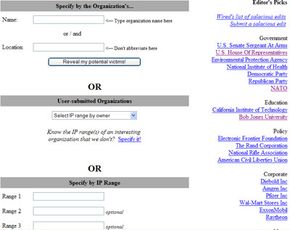If you've ever used the online encyclopedia Wikipedia, you might have noticed that editing an article is as easy as clicking the "edit this page" tab, making your changes and clicking "save." But it's this ease of editing that's both Wikipedia's greatest strength and its weakness: Anyone can edit Wikipedia -- even anonymously.
Stories frequently surface about an organization or individual altering a Wikipedia entry, either maliciously or for the sake of a practical joke. But limiting people's ability to easily edit Wikipedia would infringe on one of its most celebrated features and what's arguably the key to its success.
Advertisement
Wikipedia has a variety of tools to deal with malicious editors. The site offers extensive tutorials about what it looks for in a good encyclopedia entry and how to clean up articles. Many Wikipedians -- frequent editors of the encyclopedia -- show fierce loyalty to the site, acting as its watchdogs and correcting potentially damaging edits. Wikipedia keeps a record of all changes so that a defaced or otherwise unsatisfactory article can easily revert to an older version. The site also has several features that can be used or requested by Wikipedians, including locking down pages, blocking certain users and flagging articles that violate the site's guidelines.
Despite all of these tools, Wikipedians can't be everywhere. With more than 1.9 million English-language articles alone, the potential for abuse is enormous, especially by anonymous users [source: Wikimedia]. Enter the WikiScanner, a free program unveiled in August 2007 by Virgil Griffith, a graduate student studying computation and neural systems at the California Institute of Technology and a visiting researcher at the Santa Fe Institute.
Whenever an unregistered, anonymous user edits a Wikipedia entry, the site logs the user's IP address, the unique string of numbers that identifies each computer connected to the Internet. The WikiScanner uses these records to trace the IP addresses of anonymous Wikipedia editors. By comparing the IP addresses against a database of companies that own them, the Scanner can name the editor, or at least the organization responsible for the user's access.
The results have been astounding -- tens of millions of anonymous edits, performed by more than 180,000 organizations, some of them in clear violation of Wikipedia policy. Among the many organizations cited: the FBI, CIA, Britain's Labour Party, the Vatican, Wal-Mart, the Republican Party, the Church of Scientology, Dell Computers, Microsoft, Apple and the United Nations.
In this article, we'll take a close look at how the WikiScanner works, look at some particularly controversial or simply bizarre examples of anonymous editing and consider some of the reactions to the WikiScanner. We'll also show you how you can use the WikiScanner to see what some organizations and companies may be up to on Wikipedia.
Advertisement



